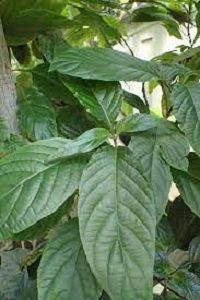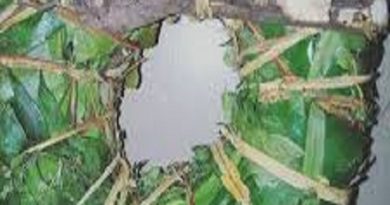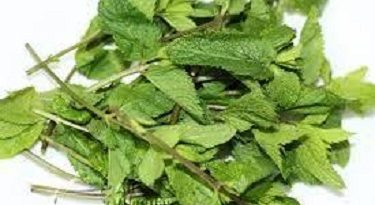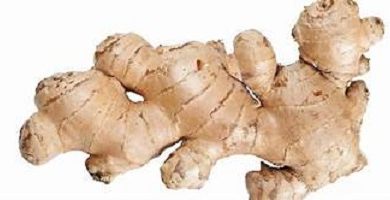Side Effects of Justicia Carnea/Ewe Eje, Uses/Benefits
Side Effects of Justicia Carnea leaf/Ewe eje, Uses &Benefit

Medicinal plants are becoming more popular in healthcare programs due to their locality, accessibility, and cheap cost.
Notwithstanding the therapeutic importance of these medicinal plants, some toxic substances have been shown to be present in large numbers of these plants.
Consumption of medicinal plants without examining their efficiency and safety can result in unexpected toxic effects, especially on organs in the body such as the liver and kidney.
Justicia carnea, also known as Hospital Too Far, Blood of Jesus, “Ewe ajeri” or “Ewe eje” in Yoruba, and “Ogwu-Obara” in Igbo, is a flowering plant used in traditional African medicine to treat anemia, inflammation, fever, diarrhea, liver diseases, arthritis, respiratory, and gastrointestinal disorders.
The researchers in the paper, Clinical Phytoscience, had assessed the safety of J. carnea leaf as a blood tonic in healthy male Wistar rats.
Found that although J. carnea leaf extract is safe and may increase red blood cell, hemoglobin, packed cell volume, and platelet count, at larger doses and over time, it caused evident liver and kidney harm.
This article offers you the nutritional composition and health benefits of Justicia carnea or ewe eje.
What is Ewe eje (Justicia carnea leaf)
Acanthaceae blooming plant Justicia is named after Scottish botanist James Justice. Nigerians use it as a blood tonic.
Boiling produces crimson red liquid. Anemic patients, post-menstrual women, and expectant ladies buy the leaves locally. It is a common decorative plant in Africa and also fences Nigerian dwellings.
Researchers using animal models found that Justicia Carnea boosts blood more than blood tonics. It quickly normalizes blood levels.
“Hospital too far” or “Blood of Jesus” are frequent names. Igbo call it “ogwu Obara”. Yoruba name it “ewe eje” (blood leaf) or “ewe ajeri” (Jehovah’s Witness leaf). “èwe ajeri” is a reminder that Jehovah’s Witnesses use the leaves as a blood transfusion replacement.
Origin
James Justice, a Scottish botanist, developed Justiciar Carnea, an Acanthaceae plant. When boiled, the water turns red and can be taken ordinarily or with milk to add taste.
Ewe eje has been in use for ages and has been medically proven to be a blood tonic. This may be credited to its rich phytochemical, nutrient, and vitamin composition.
Nutritional Composition of Ewe Eje (Justicia carnea)
Flavonoids, tannins, saponins, alkaloids, phenols, and terpenoids are found in many phytochemical investigations of plant extracts. The aqueous leaf extract contains vitamins A, B1, B12, B6, B9, B2, C, and E. The plant had high vitamin C, iron, and calcium concentrations, but low magnesium, zinc, and copper contents.
Uses and health benefits of Ewe eje (Justicia carnea leaf)
The main use of Justicia carnea leaves is to improve blood production. Pregnant ladies, anemic patients, and convalescents consume ewe eje to raise blood. Ewe eje helps cure anemia and diabetes.
Soups and yam porridge utilize ogwu Obara. Efinrin, ugwu, and other vegetables may be used with it. Some like chewing the leaves, while others add them to meals or make tea with other plants.
7 Amazing Health Benefits of Justicia Carnea (Ewe Eje)
These metabolites and minerals make Justicia carnea therapeutic. Some of Justicia Carnea’s (Ewe Eje) health benefits include;
- Increases Blood Production
- Avoids Anemia
- Anti-Diabetic
- Strong Antioxidant
- Protects Liver
- Reduces Cholesterol
- Increases Immunity
Justicia carnea recipe ~ How to make Ewe eje Extract…how to prepare Justicia carnea
Different people make ewe eje or ajeri. Some enjoy boiling, while others prefer favor-soaking.
Ingredients needed:
- A glass
- 8-10 justicia carnea leaves
Method
- Firstly, cut from the stem, some fresh or dried Justicia carnea leaves.
Then, wash the Justicia carnea leaves carefully to remove all forms of insects and dust.
3. After that, pour a cup of water into a pot and bring it to a boil.
4. Then, turn off the heat and then soak the leaves in the pot.
5. Lastly, cover and leave for about fifteen minutes.
Alternatively,
Add the leaves and water to a saucepan and cook until crimson.
Add milk or honey to taste before drinking.
Bottom Line
Justicia carnea may be anti-anemic, antioxidant, antidiabetic, hepatoprotective, and immune-boosting.
However, additional research is needed to determine the mode of action of the plant, and its effects on humans.
Lastly, always consult with your doctor before using the plant for any medicinal purposes.
What are the benefits of the Justicia plant?
The management of inflammation, gastrointestinal problems, respiratory tract infections, fever, pain, diabetes, diarrhea, liver ailments, rheumatism, and arthritis are treated with numerous Justicia species.
They are anti-inflammatory, anti-tumoral, antiviral, and analgesic.
What is the health benefit of blood leaf?
This herb boosts blood. Justicia carnea increased red blood cells, platelets, and hemoglobin in many tests. The plant’s high iron content made this possible.
Justicia carnea for infection? Can Justicia carnea cure infection?
Many species of Justicia have been used in the traditional treatments for respiratory tract infections, inflammation, gastrointestinal problems, fever, diabetes, liver ailments, diarrhea, arthritis, rheumatism, anemia, cancer, HIV, and diabetes include several Justicia species.
Blood of Jesus leaf in Yoruba? What is the Yoruba name for the blood of Jesus leaf?
Justicia carnea, also known as Hospital Too Far or Blood of Jesus, “Ewe ajeri” or “Ewe eje” in Yoruba, and “Ogwu-Obara” in Igbo, is a flowering plant used in traditional African medicine to treat anemia, inflammation, fever, diarrhea, liver diseases, and arthritis respiratory diseases.
What does Justicia do?
This herbal mixture lowers cholesterol, and treats arthritis, blood pressure, and Alzheimer’s. It is also efficient as a bitters tonic.
What is the function of Justicia carnea?
Several Justicia species are used in traditional African medicine to treat anemia, inflammation, fever, diarrhea, liver illnesses, arthritis, and respiratory and gastrointestinal disorders.
Which leaf is used for healing?
Healing leaf?
Can a pregnant woman drink Justicia carnea?
Are you pregnant and need a blood boost? In any case, taking Justicia carnea leaves extract every day may improve blood levels with iron and vitamins.
What is efirin leaf in Yoruba?
Scent leaf, known as efinrin in Yoruba, nchanwu in Igbo, and daidoya in Hausa, and Ocimum gratissimum scientifically
What is Nauclea latifolia in Yoruba?
Egbo egbesi
Nauclea latifolia, “Egbo egbesi” in Yoruba, “Ubulu inu” in Ibo, and “Tabasiya” in Hausa is a Rubiaceae usually known as pin cushion trees.
What is the use of ewe Laali?
It has been used traditionally to treat headaches, hemicranias, lumbago, bronchitis, boils, ophthalmia, syphilis, sores, amenorrhea, scabies, spleen ailments, dysuria, bleeding disorders, and skin problems.
What is okpete leaf in Yoruba?
West African forests have the plant. In Nigeria, it is called Okpoto or Okpete in Igbo, kakii-zuwa in Hausa, and tete-egun in Yoruba.
How to use the blood of Jesus’ leaf
Blood production is Justicia Carnea’s main application. Ewe eje is mostly used to enhance blood. Nigerians have always used this herb as a blood tonic.
Pluck the leaves off the stem, rinse, and boil them.
A daily intake of Justicia carnea leaves extract may boost blood iron and vitamin levels.
Blood of Jesus leaf benefits
Its anti-obesity, blood sugar-lowering, anti-malaria, and hepaprotective effects complement its blood-boosting capabilities. There’s more! Your garden needs this herb.
Dosage
This blood tonic serves as a medicinal herb. However, caution should be taken as the higher dose at 1200 mg/kg could cause noticeable tissue injury
Justicia carnea recipe ~ How to prepare Justicia carnea
- To prepare the juice, first, remove a few fresh leaves from the stem.
- Then, sort and wash them to get rid of dust and insects.
- After that, soak the leaves in boiled water in a closed container for about 15 minutes
How do you use Justicia carnea leaf?
- In Nigeria, the leaf of Justicia carnea is normally made with veggies to prepare the soup.
- It is also boiled in water to produce tea or cooked with other medicinal herbs for therapeutic use.
What is the importance of Justicia carnea?
This herb boosts blood, increased red blood cells, platelets, and hemoglobin in many tests. The plant’s high iron content allows this.
How to use Ewe eje
To make tea or medicine, it is cooked in water or prepared by cooking with other medicinal plants. In Nigeria, the raw leaves are eaten or used to garnish yam porridge with Ocimum gratissimum (Efinrin).
Ewe eje benefits
This herb boosts blood. Justicia carnea increased red blood cells, platelets, and hemoglobin in many tests. The plant’s high iron content allows this.
Uses of Ewe eje
Inflammation, gastrointestinal problems, respiratory tract infections, fever, pain, diabetes, diarrhea, liver ailments, rheumatism, and arthritis are treated with numerous Justicia species traditionally.
They are anti-inflammatory, anti-tumoral, antiviral, and analgesic.
Side effects of blood of Jesus leaf (Justicia carnea leaf Side Effects)
Ewe eje is healthful to eat. Before using the leaves medicinally, see a doctor. Moderately consuming ewe eye has no side effects. However, don’t consume it uncooked.
Justicia carnea local name in Ghana
This plant is locally known in Ghana as “Kwehu nsusua”, “Abeduro”, “Anona Ntroba”, “Yaa Asantewaa” and “Kantosey”
Justicia plant and fertility ~ Is the plant good for pregnancy?
It is usually called “Ogwu-Obara” meaning blood builder by the Igbos from Nigeria is popularly used as a blood tonic, especially by pregnant women because of its ability to ameliorate anemic conditions
How to care for justicia plant ~ Basic Care Instructions
- Firstly, plant the feed. Apply a balanced liquid fertilizer monthly.
- Secondly, Watering. Keep soil evenly moist.
- Thirdly, Soil. Fertile, well-drained soil.
- Lastly, Basic Care Summary. Thrives in rich soil and with ample water. Eliminate faded blooms to keep the plant looking its best.
Justicia carnea yellow
Large plumes of golden yellow flowers are seen from spring to fall on this upright grower. The shrub can grow 3-5′ tall in containers however its size is easily managed by pruning.
Justicia carnea white ~ Also known as a White Brazilian Plume


